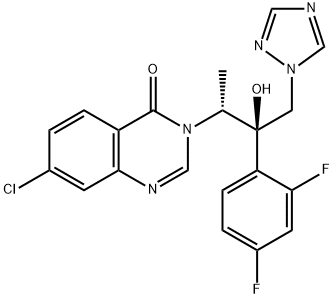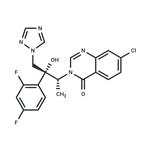Description
Albaconazole (UR-9825) is a new triazole with a potent, broad spectrum of antifungal activity, good pharmacokinetics, and excellent oral bioavailability. Its in vitro activity against Scedosporium prolificans and Paecilomyces distinguishes it from other new triazoles. Current information is largely based on limited in vitro and animal studies; the highest level clinical trial evidence comes from a phase II study on treatment of vulvovaginitis.
Chemical Properties
White to Off-White Solid
Uses
An antifungal agent as neuroprotectant.
Mechanism of action
Albaconazole has good in vitro activity against pathogenic yeasts , dermatophytes, and some filamentous fungi including S. prolificans and Aspergillus spp. and has been shown to be active in the treatment of systemic aspergillosis, candidiasis , S. prolificans infection, and cryptococcal meningitis in experimental animal models. Furthermore, it has potential in the treatment of Chagas’ disease (Trypanosoma cruzi infection). Albaconazole is produced and developed by J Uriach & Cia (Barcelona, Spain) and, in common with the other azoles, works by inhibition of ergosterol synthesis. It is obtained by a new enantioselective synthesis using Evan’s chiral auxillaries, and the substitution of a halogen radical at the 7-position of the quinazolinone ring produces the most potent products in vitro.
Pharmacokinetics
Data on bioavailability, drug distribution, excretion, drug interactions, and other pharmacodynamic and pharmacokinetic variables are limited. In a phase I study involving 72 healthy volunteers with varying dose levels of 5, 10, 20, 40, 80, 160, 240, 320, and 400 mg, albaconazole was rapidly absorbed, reaching Cmax values in 2–4 hours. The drug was widely distributed throughout body fluids and the apparent Vd/f was 5 l/kg. Its absorption rate (Cmax) and area under the curve were dose proportional for doses between 5 and 80 mg (half-life 30–56 hours), but nonlinear pharmacokinetics was seen in higher doses. The amount of binding to plasma proteins has not been described. CSF penetration of approximately 15% of serum level has been demonstrated in a rabbit model of cryptococcal meningitis with higher doses.
Toxicology
There are currently only limited toxicity data available. In a phase I study, single doses of up to 400 mg of albaconazole were very well tolerated in volunteers, and no serious adverse events were reported. No significant clinical trends in safety parameters were noted. No adverse events were observed in 50 trial patients taking a single dose of between 10 and 320 mg of albaconazole. Albaconazole was also well tolerated in animal studies, including rats, dog models for T. cruzi (1.5 mg/kg/day) (Guedes et al., 2004), and rabbit models for scedosporiosis (15–50 mg/ kg/day). However, in the T. cruzi model, one in four dogs suffered weight loss and gastrointestinal disturbance after 120 days when treated for longer (150 days).

